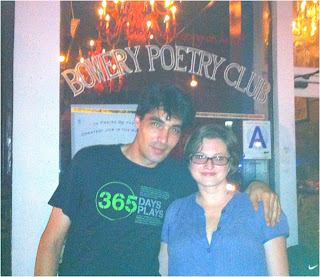Farewell to the Bowery Poetry Club
In New York, the people, especially the artists, spend a lot of time wishing they had experienced the city in the past, when it was “the real New York”. In the 90s we longed for the rawness of the 70s, in the 70s they longed for the wildness of the 50s and in the 50s I’m sure they must have been jealous of the roar of the 20s. But every so often, for those who live and work here, there is a place, and a time, that is not only the real New York, but is your own New York. For a decade Bob Holman and his merry band of misfits created just such a place and time, and for many artists who came of age during that 10 years, the Bowery Poetry Club was a refuge, a playground and a home.
Back in 2005 our show Sticky was at Galapagos in Williamsburg (another venerable dive gone the necessary way of glitz and gloss) and itching to get back to Manhattan. Bob wanted us, but on his terms, he wanted more shows, he wanted a cover, basically he wanted us to take ourselves as seriously as he took us, even though very few others did. Bob did this for every show, for every poet or burlesque artist, every bartender, every crazy cat from first time performers to legitimate superstars. While all of us struggled and scrambled so hard to “make it”, Bob knew we had made it, that performing at BPC was making it.
Now the club as we knew it is no more. Eliel and Duv drank the final beer last night (they even gave me a sip). But the end of the club doesn’t really say anything about “these days” or the state of the arts. It is not a recrimination, nor an outrage. Let’s face it, it’s kind of a miracle that a place that mostly sold poetry lasted as long as it did. It was a miracle that so many of us got to be a part of. So today, as we mourn the passing of that dark little room in the midst of the glowing furnace of the world’s capital, we need to remember something. We are the real New York, it isn’t in some distant past, it isn’t a fading dream, it is here and now and ours. I will always be grateful to Bob and the Club for teaching me that.


